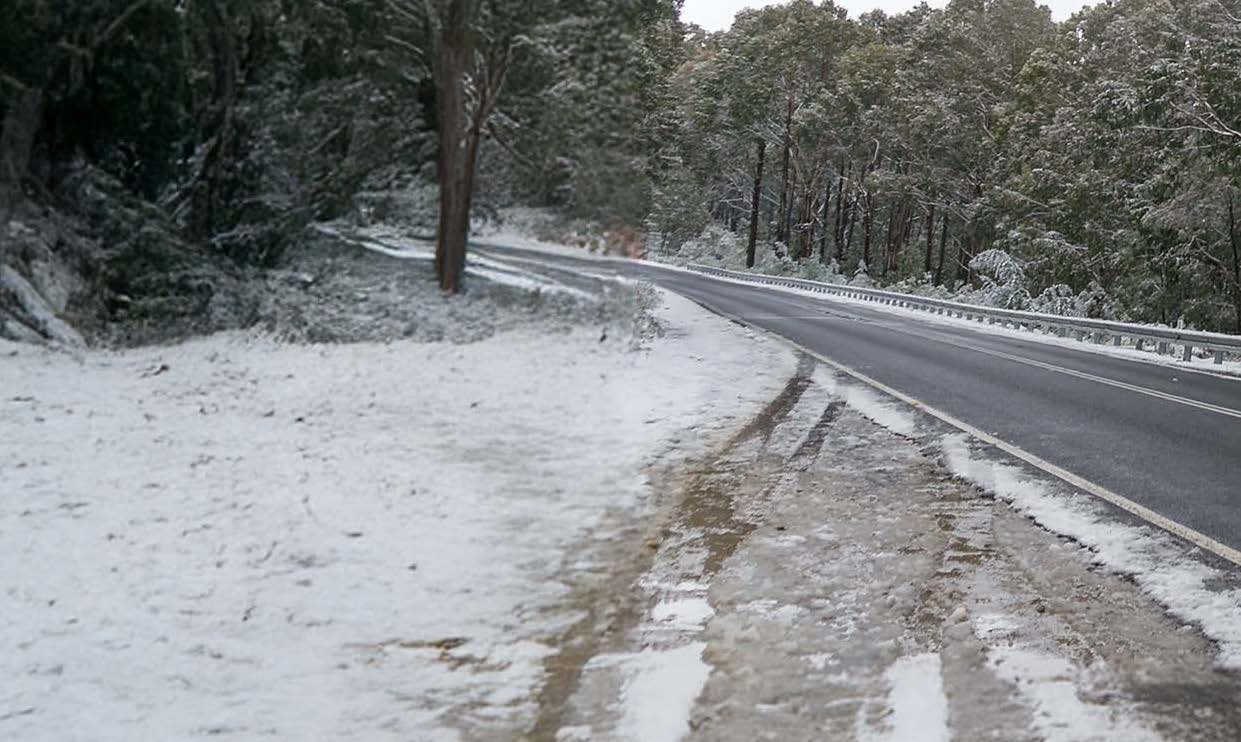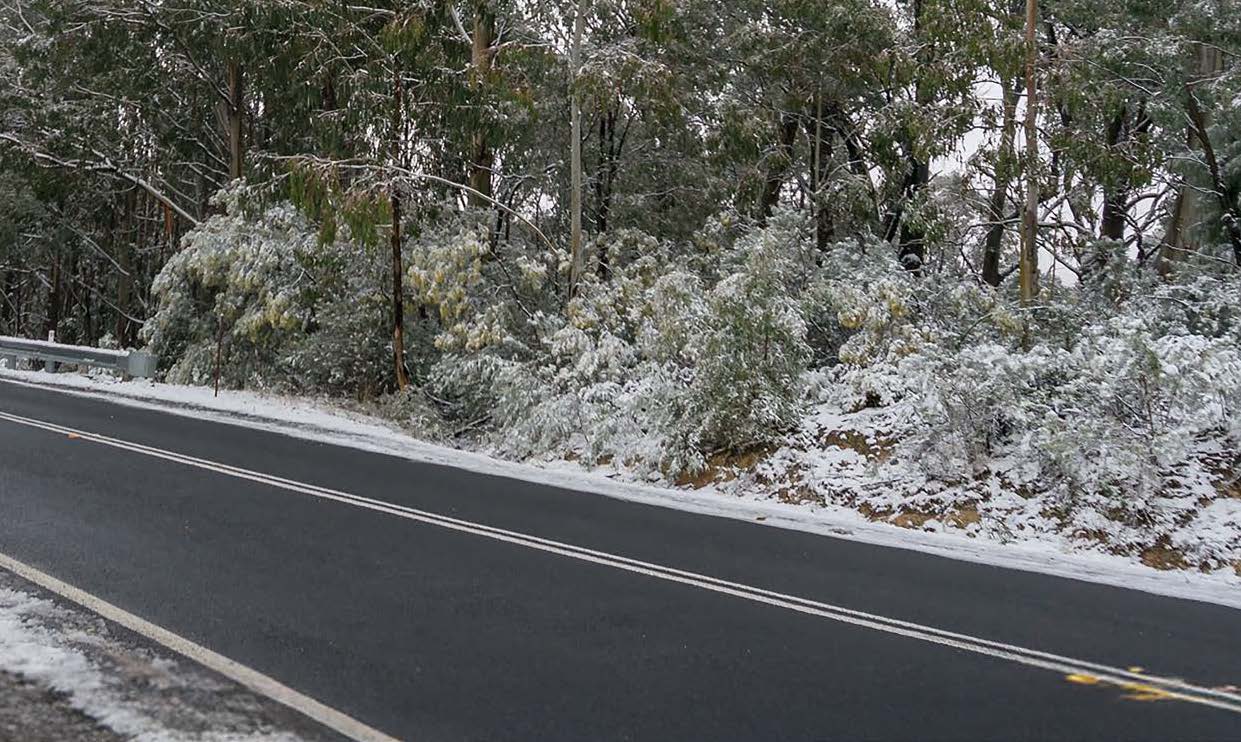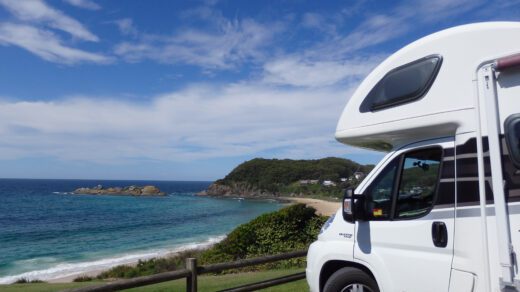Australia’s winter months open the door to some breathtaking destinations—from snow-dusted peaks to peaceful coastal hideaways. But while the scenery is rewarding, colder weather brings its own set of obstacles for RV travellers. This guide offers practical advice to help you stay safe and comfortable during your winter road trip.

1 – Getting Your RV Winter-Ready
Tyres and Braking Systems
Make sure your tyres are in good condition, with at least 3mm of tread (the legal tread depth requirement is 1.5mm but we recommend changing before this) and no visible cracks or wear. Check and maintain the recommended tyre pressure, which can fluctuate with colder temperatures. Inspect your brakes regularly to ensure they’re functioning safely.
Batteries and Heating
Cold conditions can weaken battery performance. Test your battery and replace it if needed. Confirm that your heating system is in working order and think about bringing extra gas or fuel for extended use in cold weather.
Water Supply and Plumbing
Insulate your water hoses and use RV-safe antifreeze in holding tanks to prevent freezing. Disconnect and store hoses when they’re not in use. Keeping your interior warm can also help protect plumbing from freezing.
2 – Keeping the Inside Cozy
Improving Insulation
Thermal blinds or curtains can help retain heat. Add draft stoppers to block cold air at vents and door gaps. Rugs or carpets not only feel nice underfoot but also help insulate the floor.
Heating Options
If your RV has a built-in heater, make sure it’s been serviced and works reliably. Portable electric heaters are a great supplement at powered sites—but always follow safety instructions when using any type of heater. Diesel heaters are also a popular option being efficient and reliable but always make sure they are installed correctly for safety of intake/exhaust.
Carbon Monoxide (CO) Detector
Installing a carbon monoxide (CO) detector is highly recommended because carbon monoxide is a deadly, invisible gas that can be produced by many common RV appliances — and it gives no warning signs before it becomes dangerous. Install near sleeping areas, test monthly and replace batteries regularly. The unit should be replaced every 5-10 years.
3 – Driving Safely in Winter Conditions
Adapting to the Roads
Slow down on icy or wet roads and leave extra space between you and the car ahead. Use low gears for better control on hills and avoid sudden braking or turns to reduce the risk of skidding.
Visibility on the Road
Before starting your drive, clear your windows, mirrors, and lights of any condensation or frost. In low visibility, switch to headlights (but avoid high beams in fog). Watch for black ice, especially in shaded or elevated areas.
Snow Chains and Mountain Driving
If you’re heading into the high country, snow chains are often required—and in some places, like Mount Hotham, only certain types are permitted. Practice using them before your trip and always check up-to-date local regulations.

4 – Choosing and Setting Up Your Campsite
Winter-Friendly Campsites
Pick caravan parks that stay open in the colder months and provide winter-ready facilities like heating and snow-clearing services. Avoid sites with poor drainage to steer clear of flooding.
Smart Parking Tips
Level ground is best for stable parking. Steer clear of spots under heavily snow-laden trees or anywhere prone to falling debris or snow.
5 – Looking After Yourself on the Road
Dressing and Sleeping Well
Wear several warm layers and choose materials like wool or thermal fabrics. A quality sleeping bag rated for low temperatures can make chilly nights far more comfortable.
Fresh Air and Ventilation
Warmth is important, but don’t forget to ventilate your RV to prevent condensation and keep the air fresh. Roof vents or slightly open windows can help moisture escape.
Being Prepared for Emergencies
Pack a winter emergency kit that includes essentials like a torch, first-aid supplies, extra batteries, non-perishable food, water, and warm blankets. Stay on top of weather updates and be ready to adjust your plans if needed.
With the right preparations and precautions, winter RV travel can be a safe and memorable adventure. Embrace the crisp air and scenic views—but make sure safety and readiness are always part of your journey.





